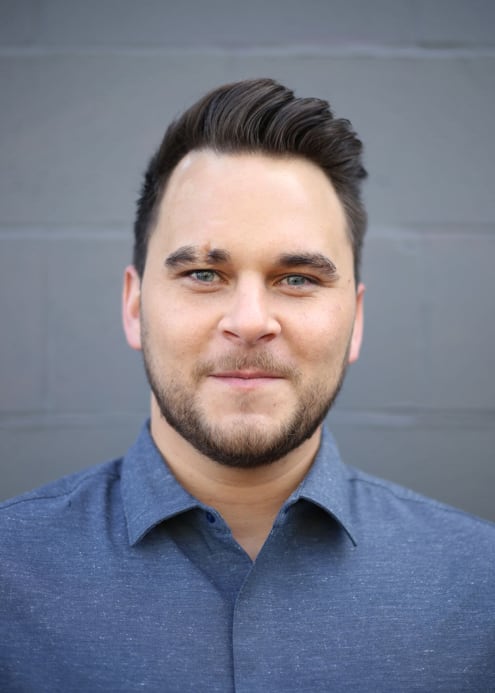UAlberta graduate using personal experience with nerve condition to help others overcome chronic pain
Amanda Anderson - 20 November 2020

Geoffrey Rachor will be convocating on November 20 with a Master of Science in Rehabilitation Science.
For Geoffrey Rachor, It all started with an interest in chronic pain.
The Master of Science in Rehabilitation Science (MSc RS) graduate didn’t just have a natural curiosity for the subject, though. This was something more personal.
In 2011, Rachor was diagnosed with a chronic pain condition called post-herpetic neuralgia (PHN) — lasting nerve damage resulting from the shingles virus.
“My trigeminal nerve was affected, which is essentially a large nerve network spanning the face,” explained Rachor. “[Shingles] very quickly affected my forehead and hairline, as well as my eyebrow, eyelid and, eventually, my eye.”
The virus resolved in 2012, but the effects, unfortunately, did not.
“I was left with scar tissue in my eye and a severe astigmatism-related condition called keratoconus, which is when your cornea thins and gradually bulges outward into a cone shape. This can cause blurry and distorted vision.
“I also found myself dealing with major mental health impacts and the effect those had on my life and studies.”
Despite the challenges of ongoing pain, Rachor never gave up on finding new ways to manage his condition and reach his goals. He advocated for his own diagnosis and broke free of the barriers that were holding him back.
“My condition, of course, still requires some maintenance, such as icing the nerve area, undergoing scar resurfacing procedures to untangle some of the nerve fibres and receiving botox every three months for pain management.”
While some may have taken a step back after such a physically and mentally draining ordeal, Rachor let his experiences lead him forward to the Faculty of Rehabilitation Medicine and a degree in rehabilitation science.
“During my time in the program, I researched factors associated with return-to-work in Albertan workers with co-morbid traumatic psychological injuries and musculoskeletal injuries,” he said.
“Essentially, I examined the factors associated with successful return-to-work outcomes among those with or without present physical injuries, but who did have mental health disorders.”
Rachor, who worked with Department of Physical Therapy Professor Doug Gross on his thesis, found that physical pain and psychological trauma frequently go hand-in-hand, and that, as a result, individuals experiencing a dual diagnosis have significantly worse return-to-work outcomes.
His research also provided some insight into his own condition.
“Beyond my own thesis work, I was provided the opportunity to delve deeper into the relationship between chronic pain and psychology,” said Rachor, who also has a Bachelor of Arts (Honours) in Psychology from MacEwan University. “This allowed me to gain a broader understanding of chronic pain and how it affects people, including myself.”
Psychological injury and physical pain, Rachor said, is not something that is widely acknowledged as being connected by those with chronic pain.
“For many people, hearing that pain has something to do with psychological processes, such as those occurring in depression and anxiety, can bring about a feeling of skepticism. For pain to be understood as anything other than physical may be an uphill battle for a lot of people, but we know from research that psychological processes can directly alter the physical experience of pain.”
For Rachor, though, he sees it as a way to help manage chronic pain conditions like his own.
“This realization was very positive for me — knowing that psychological processes influenced my perception of pain was something I could build off of.
“Bringing chronic pain into the realm of psychology made my pain become something tangible that I had some sort of control over. For example, spending a few minutes on deep breathing exercises in the morning became essential to my routine, allowing me to wake up and have power over my pain.”
With a master’s degree in rehabilitation science under his belt, Rachor hopes to pursue a career in helping others overcome chronic pain using psychological and physical techniques. He will be entering into the University of Regina’s graduate degree program in clinical psychology, putting him that much closer to his dream job.
“I would like to work with individuals experiencing chronic pain, not necessarily just nerve pain, using the experiences I have gained from my MSc and applying them as a clinical psychologist in the future.
“My goal is to help others, as I have been able to help myself, lead their own lives instead of letting their pain overcome them.”